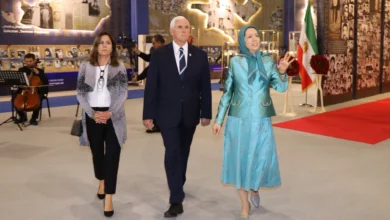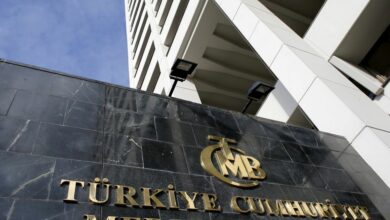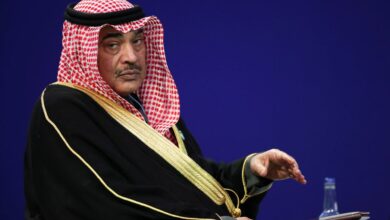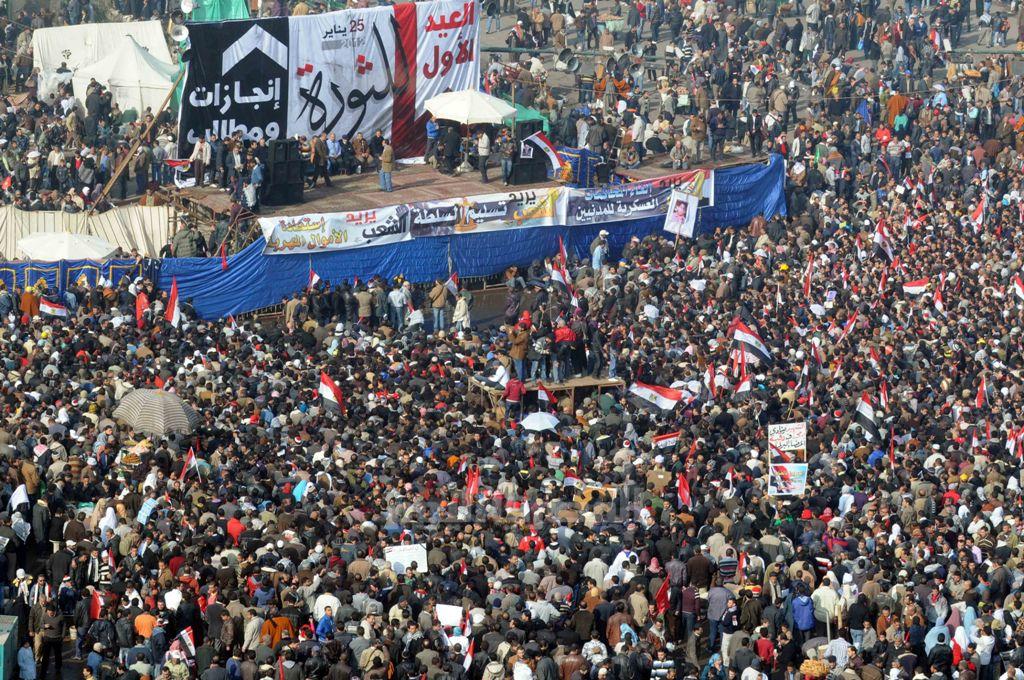Last week the Muslim Brotherhood’s spokesperson Mohamed Saad el-Katatney announced that the banned group will field candidates for 20 percent of seats in the Shura Council, saying that participation is part of "the general policy that the Brotherhood has been following for decades."
The announcement seemed like a snub to the government, which recently launched a new arrest campaign against the Islamic group, possibly in an effort to prevent it from participating in elections. The last time the Brotherhood ran for parliament, in 2005, the group won 88 seats, in large part thanks to its strong grassroots support, which has developed over decades through the Brotherhood’s charity work, medical clinics, and educational services.
On Wednesday a Brotherhood spokesperson said the group has not decided where they will field candidates or how many they will back.
The same day, state security renewed Brotherhood second-in-command Mahmoud Ezzat’s detention. Party spokesperson Essam el-Erian is also still behind bars.
In an interview with Al-Masry Al-Youm, Brotherhood senior leader Abdel Moneim Abul Fotouh spoke about how the government crackdown on top leaders in the run up to parliament elections matters, and how it is "haram" (forbidden) to vote for the ruling National Democratic Party (NDP).
Al-Masry Al-Youm: How far is the recent crackdown on the Brothers limiting their participation in politics? Is it paralyzing the group?
Abdel Moneim Abul Fotouh: The Brotherhood is a popular and political force in a corrupt and tyrannical atmosphere, in a [political] society that deals with everyone through security forces. Effectively, the "party" that we and other opposition groups are up against is the state security forces. And this is not the police’s fault; it’s the political leadership’s.
They gave this [security] apparatus the right to deal with politicians. As a peaceful political coalition, the police should have nothing to do with us. It’s a body for criminals and outlaws, those who carry arms, not those who carry ideas and opinions. However, the state has failed to interact with us in a competitive way. And this is across the board–security meddles in everything. The government has given them the green light to deal with everything. Like the bread crisis. Security forces were sent down to bakeries to keep order at bread queues.
So it’s become natural that during elections, [the government] starts detaining activists, those who organize the canvassing campaigns, and those who might run, one after another. So in a way they’re rigging the votes in advance. And, of course, [the arrest of these people] affect us. They are not dispensable. The organizers of the elections, like Dr. Essam el-Erian and Mahmoud Ezzat and Osama Nasr, these are the people who prepare the campaigns for the Shura Council, and there are another 500 detained members, some of whom are suitable for candidacy for the Shura Council and the People’s Assembly elections.
No doubt this has an effect. It makes us search for substitutes, leaving the job of running [our campaigns] in the hands of those who might be less experienced, less efficient or less popular.
Al-Masry: Following internal elections, what’s known as "the conservative" trend has dominated the Guidance Bureau’s membership, and they have always called for limited participation in politics. Do the arrests and the intense crackdown give strength to their argument? Are we seeing fewer Brothers in the political arena?
Abul Fotouh: It’s quite the opposite. And this proves the press wrong. I’ve said this before: Their story about the control of "the conservatives" over the Bureau and the dismissal of the "reformers" is wrong. Indeed, there are conservatives among the Brothers, but this is the case with any coalition built around faith or politics or ideologies. You can find radicals even among Marxists, communists and liberals. However, using democratic mechanisms and institutions such as the People’s Assembly and the Shura Council and penetrating them–and syndicates and faculty unions as well–is a strategy of the Brotherhood, and it aims to benefit from the democratic process in order to achieve reform and reach out to people.
We have many aims, but reaching power is not one of them. Under the current oppressive regime, there isn’t a path to reach power. Even if the Muslim Brotherhood wins 500 seats in parliament, does this give them a chance to achieve power in Egypt? No, not in Egypt. There simply isn’t a way. This is a regime that doesn’t honor the concept of handing over power. It doesn’t mean that this not what the Brotherhood wants. Like other political groups, it wants to reach power through a peaceful democratic process. But this is not an option here.
Al-Masry: What about supporting Mohamed ElBaradei and the coalition backing him and his demands for constitutional reforms? What’s the Brotherhood’s position regarding this? Is the Brotherhood taking a back seat?
Abul Fotouh: We’re still here. We’re involved. There was a meeting a day earlier that I was supposed to attend but I couldn’t–other Brotherhood members did–which all political groups were attending. And these are groups that we allied with even before ElBaradei appeared on stage. Our coalition was called the National Action Committee and it included figures like Hassan Nafaa. I was a member of it. We put forward demands that are similar to ElBaradei’s. These are demands that have been pending and that opposition forces have been calling for since 1984. For example, abolishing the emergency law, having judicial supervision of elections, freedom to publish, etc. These are all old demands. And the Brotherhood did participate with ElBaradei’s coalition in calling for all this.
Al-Masry: But are you supporting ElBaradei’s candidacy?
Abul Fotouh: No one can support ElBaradei. ElBaradei is not a candidate. But we support his demands for constitutional changes 100 percent. We’re not in disagreement. Like I said, these are demands we’ve had since 1984. And if you go back to older records, you’ll see this yourself.
Al-Masry: But if ElBaradei succeeds in running for the top job would the Brotherhood support him?
Abul Fotouh: Of course. Why not? We have no problem with that. We have nothing against him. However, we cannot decide now. Because when the doors for candidacy open up, there may be better candidates. Then we can choose who to back. And the man has already said that he won’t run. It’s not possible for him or others. That’s why we’re calling for opening the doors, for genuine elections to take place, elections that allow candidacy for those eligible according to Article 74 of the Constitution. There are pre-set conditions for this: that the presidential candidate is over 40 years of age, of Egyptian parentage, and has access to full political and civil rights. That’s it. Anyone who satisfies these conditions should be able to run, be it ElBaradei or others, Nasserists, Marxists, whoever.
Al-Masry: Is boycotting the elections altogether a possibility for the Brotherhood, in the case that contenders to the NDP are weak and it becomes clear that a Mubarak–father or son–will inevitably win?
Abul Fotouh: Theoretically, it’s a possibility. But in practice, it’s very difficult. It’s a humiliation to Egypt to think that it cannot produce good enough, patriotic, independent candidates who can defend their interests.
Al-Masry: It’s not a question of availability [of deserving candidates] but access to candidacy under the current constitutional conditions …
Abul Fotouh: That’s why we’re addressing [constitutional] reform. If the Constitution is not amended, and if the door is not opened, then the elections will be a farce. In such a case, we’ll certainly boycott. Because there won’t be anyone except the NDP candidate. We’ve announced several times–but the media is refusing to believe us–that we won’t support any NDP candidate, whoever he is. Gamal Mubarak, Safwat el-Sherif, whoever he may be. We’ve said this several times.
The NDP is the main hand behind corrupting Egypt, and behind its lag in all sectors–scientifically, culturally, politically. Only a person without conscience or principles, patriotic or religious, would vote for the NDP. The catastrophes, the retardation, the extremism that Egypt is living through is because of the NDP. Even on the religious level, they’re the reason for it. If it’s possible to say this, here I am saying it it: It is haram (forbidden) for a citizen to give his vote to the NDP candidate, whether in parliament or presidential elections. This is my position. I’m not a mufti. But it’s haram, religiously, politically and morally for a citizen to give his vote to the NDP candidate.
Al-Masry: What does the Brotherhood think of the recent appointment of Ahmad el-Tayeb as sheikh of Al-Azhar?
Abul Fotouh: We have reservations regarding Al-Azhar itself.
Al-Masry: Yes, but it has been said that el-Tayeb in particular opposes the Brotherhood.
Abul Fotouh: Whether he hates us or likes us, it’s not an issue. And the problem with Al-Azhar doesn’t lie in its sheikh, whether it’s el-Tayeb or someone else. The problem with Al-Azhar is that it lost its independence and credibility because of the government’s association with it. So it turned from an educational institution that speaks for a forgiving moderate brand of Islam to a stagnant dead organization, a part of government.
Al-Masry: Do you regard the appointment of el-Tayeb as a snub to the Brotherhood?
Abul Fotouh: We respect Al-Azhar as an Islamic institution. And its sheikh as a religious icon.
Al-Masry: But if this religious icon delegitimizes you as an Islamic group, will this affect your image among Egyptian citizens?
Abul Fotouh: It has no worth, because Al-Azhar has already lost its credibility. In turn, any perspective that Al-Azhar adopts in line with the government’s [perspective] will not have credibility on the street and will be considered worthless. Al-Azhar can only gain credibility when it’s honest in its opinions, when it’s independent from the government.
The Egyptian citizen now looks at al-Azhar as a mouthpiece of the Egyptian ruling power. And this makes us sad. And we do hope that Al-Azhar regains its independence. This can happen if its stolen endowments are returned to it so it can achieve economic independence and if the supreme body of scholars becomes elected and in turn elects the sheikh of Al-Azhar.
Al-Masry: Did the Brotherhood and Al-Azhar ever have joint activities, even in charity?
Abul Fotouh: When al-Azhar was in top shape, when it had its independence, many of the sources and scholars [that inspired] the Brotherhood were from Al-Azhar, like Youssef al-Qaradawi, Mohammed al-Ghazali, and Baleegh al-Khouli. All these are Brotherhood symbols. Where did they come from? From Al-Azhar. This generation has no similar icons from Al-Azhar. They killed Al-Azhar.
Al-Masry: What about the Salafi trend? Does it have a negative influence on the Brotherhood, keeping in mind its growing popularity and the weakness of Al-Azhar?
Abul Fotouh: It doesn’t affect the Brotherhood, it affects the whole of society. The danger of this trend–which is more correctly Bedouin or extreme and not Salafi–or its negative aspect lies in how it spreads, in the lack of a moderate trend. When this ideology spreads, it has a negative influence because it creates a religious understanding that doesn’t care about national affairs and this is what the government wants. It wants people to believe that this is piety, and that "the powers that be" should do whatever they desire, and that [people] are slaves to those in power. [Salafis] don’t spell it out like this, but this is the spirit of what they believe in.
Al-Masry: How does the Brotherhood fight this Salafi trend?
Abul Fotouh: By spreading. You can only fight ideological beliefs by presenting your own. But we don’t have fierce ideological battles with them, or with others, including leftists or extremists. This is what we’ve once done with those who advocated violence, like Islamic Jihad. We didn’t carry arms and go into battle with them. By us showing our stance, they automatically lost points.




